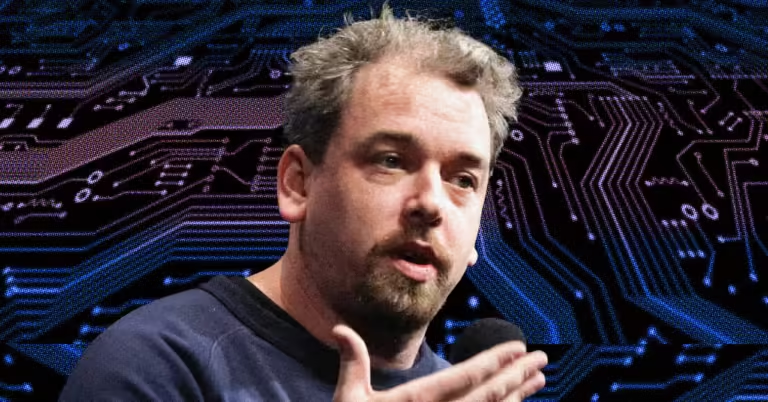When I interviewed writers and actors on the picket lines of the WGA and SAG-AFTRA strikes last year, the emotions surrounding AI were mixed, mostly negative but also including anxiety, uncertainty, ambiguity and anger.
The Burbank audience was the most uniformly vehemently anti-AI I’ve ever seen: “AI just goes away,” one animator said when asked how AI was affecting the industry, and when I asked storyboard artists Lindsay Castro and Brittany McCarthy for their thoughts on AI, they both just booed.
A year after the WGA strike, to the animators I spoke to, AI was something to be opposed, not questioned or experimented with. One animator passed by holding a sign quoting master animator Hayao Miyazaki’s comments that using AI in art is “an affront to life itself.”
It was hot, Rianda took the stage as host well after 5 p.m. He introduced writers, directors, and animation legends like Rebecca Sugar, Genndy Tartakovsky, and James Baxter, as well as union leaders, politicians, and everyday workers. “We’re not going to take your job with a computer or a soulless program,” said California Assemblywoman Laura Friedman. The mayor of Burbank, the president of IATSE, and actor and podcaster Adam Conover took turns at the microphone.
Organizers and speakers remarked on the size of the event — “We’ve never had so many people from animation in one place,” one said — and midway through the gathering, Rianda proclaimed it the biggest gathering the industry has ever seen. Rianda kept the energy high throughout the afternoon, yelling jokes and chants, his pale skin turning pink from the sun and tension.
Hundreds of animators cheered. “Indoor guys,” as several of the animators there called themselves, were easy to see as lovable underdogs, facing off against bosses intent on wiping them out using cutting-edge technology. In a comparison encouraged by Rianda at the gathering, they were not unlike the Mitchell brothers, who were initially blindsided by a cartoonish robot apocalypse but then managed to thwart it.
“The reason I’m doing this is because I’m afraid that if people don’t know what’s going to happen, the worst will happen,” Rianda told me. “I see it starting and it’s going to be really gradual at first, like the supermarket kiosks, and then all of a sudden everyone in town can’t work. They’re like, ‘What the hell is going on? Why can’t I get a job?'” I think literally thousands of jobs will be lost.
Rianda, like many other artists and creative people, has come to believe that artificial intelligence, while not inherently worthless, is a technology that’s being used by the wrong people for the wrong reasons. That’s why he’s fighting, he says: to make sure AI gets into the right hands.
” concept “AI is great, it can be used to solve climate change, cure cancer, and lots of other weird things,” he says, “but in the hands of corporations it’s like a buzz saw that will destroy us all.”

